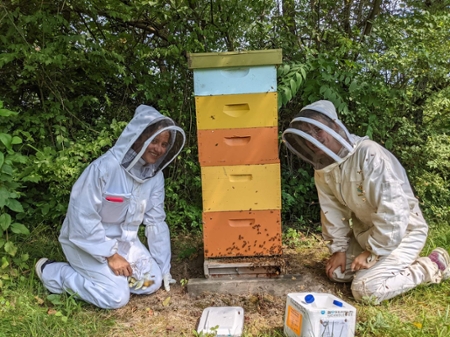Colombian student finds hive of ideas at Purdue Agriculture
“I love working with bees because, I think, they are the most interesting insects in the world. I want to learn new ways to take care of the existing populations,” Liced Giraldo Moreno said.
Moreno, an undergraduate in her final year at Universidad de Caldas in Colombia, traveled to Purdue in August as part of a six-month placement that will help her finish her degree in agricultural business management. Moreno is also working with assistant entomology professor Brock Harpur, learning about apiology (the study of bees) and translating Extension materials into Spanish. She hopes to use the skills and knowledge gained at Purdue to start her own business after she returns to Colombia and graduates.
Moreno grew up on a family farm that produced coffee and bananas and raised livestock. While working on the farm, Moreno said she was always thinking about ways to improve operations, bring in new ideas and make things more efficient. Using bees, she hopes to do exactly that.
“Women and bees, that will be the focus of my business,” Moreno laughed. She wants to start a honey production company that employs local women and she also wants to cultivate hives and rent them out to farms for pollination services.

Moreno said she was inspired to add a honey-bottling component to her business plan after she helped bottle Boiler Bee Honey in the food science department’s pilot plant. After tasting the honey harvested by Harpur and the collaborative food science team and then seeing the bottling process, Moreno said she can see how starting a similar, small-scale business back home would bring in new technologies, offer skilled jobs and provide a delicious product while supporting local pollinator populations. “Without bees there is no agriculture,” she added.
Moreno is contributing to an ongoing project in the Harpur lab that explores how different honey bee ‘lines’ perform for beekeepers in Indiana. As the beekeeping work shuts down for the winter, Harpur said a large part of Moreno’s time here will also be spent on the second part of her project; translating Extension literature into Spanish for use in Indiana and throughout Latin America.
“Our goal is for her to help us expand the literature’s usefulness to those whose first language isn't English. We're hoping she can bring some of them back with her to Colombia and we can offer them here for anyone who would prefer a copy in their native language,” Harpur added.
Moreno said the translation exercise is helping her language skills while also teaching her more about agricultural practices.
“I am excited to be able to take what I have learned and what I have created with me wherever I go,” she said.





